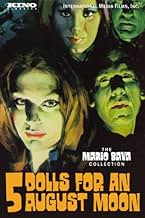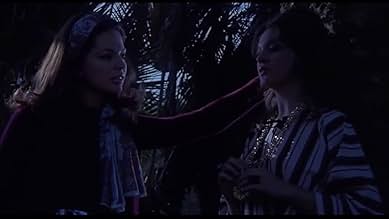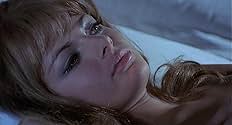IMDb RATING
5.7/10
3.8K
YOUR RATING
An industrialist invites his colleagues to his private island so they can exploit a resin formula invented by one of the guests, but a killer within the group disrupts the proceedings.An industrialist invites his colleagues to his private island so they can exploit a resin formula invented by one of the guests, but a killer within the group disrupts the proceedings.An industrialist invites his colleagues to his private island so they can exploit a resin formula invented by one of the guests, but a killer within the group disrupts the proceedings.
- Director
- Writers
- Stars
- Awards
- 1 win total
Ira von Fürstenberg
- Trudy Farrell
- (as Ira Furstenberg)
Helena Ronee
- Peggy Davidson
- (as Helena Ronée)
Teodoro Corrà
- George Stark
- (as Teodoro Corrá)
Ely Galleani
- Isabel
- (as Justine Gall)
- Director
- Writers
- All cast & crew
- Production, box office & more at IMDbPro
Featured reviews
Art direction and cinematography are as distinctive as any of Bava's other giallo films of the period, but the garbled script to what is essentially little more than a standard body-count movie really lets this one down. After a plodding and talky start, the film disintegrates into a total mess. Bava pulls off the odd visual flourish, but such scenes never gel together. Still, the mesmeric use of zooms, focus pulls, and tracking shots and the stylish use of colour ensures that, from an entirely aesthetic perspective, this film never becomes boring, and as an auteur piece, is well worth a watch. Now, if only I could work out what the hell happened in it...
The late Italian director Mario Bava (1913-1980) made a handful of genuinely great films, like Black Sunday, Lisa and the Devil, and Blood and Black Lace, along with many that almost transcend kitsch, i.e. Diabolik and Black Sabbath, and some that are simply wonderful kitsch. Of the third category, this may be the best example.
A group of rich, decadent swingers in the most tasteless fashions of the time (the year is 1970) cavort about on an island owned by one of them. One guest is a scientist with a formula that could be worth a fortune. When he refuses to sell the formula, everybody on the island starts dying one by one (a la Agatha Christie's Ten Little Indians,) the bodies literally piling up in the meat locker, just one example of the hilariously dark humor Bava brings to this dubious premise.
Bava made no bones about this movie being a paycheck job, or of his shame for it - the script was atrocious, the producer refused to let him have any say in the casting, or let Bava use most of his usual crew, and budget cuts forced the director to have almost every murder take place offscreen. But Bava's films always had a misanthropic wit(except Black Sunday, with its clear-cut good versus evil scenario,) and in the case of "Five Dolls For An August Moon," it almost seems like the director's contempt for the project actually made the end result funnier and more brazen than expected. Bava had a technical facility that most money-burning present day directors would kill for, and a complete lack of pretensions to being anything other than a hard-working director for hire. When the chemistry was just right, it could create a glorious bauble (or, less often, something even better.)
Is it good? Well, as the saying goes, how could something so right be so wrong?
A group of rich, decadent swingers in the most tasteless fashions of the time (the year is 1970) cavort about on an island owned by one of them. One guest is a scientist with a formula that could be worth a fortune. When he refuses to sell the formula, everybody on the island starts dying one by one (a la Agatha Christie's Ten Little Indians,) the bodies literally piling up in the meat locker, just one example of the hilariously dark humor Bava brings to this dubious premise.
Bava made no bones about this movie being a paycheck job, or of his shame for it - the script was atrocious, the producer refused to let him have any say in the casting, or let Bava use most of his usual crew, and budget cuts forced the director to have almost every murder take place offscreen. But Bava's films always had a misanthropic wit(except Black Sunday, with its clear-cut good versus evil scenario,) and in the case of "Five Dolls For An August Moon," it almost seems like the director's contempt for the project actually made the end result funnier and more brazen than expected. Bava had a technical facility that most money-burning present day directors would kill for, and a complete lack of pretensions to being anything other than a hard-working director for hire. When the chemistry was just right, it could create a glorious bauble (or, less often, something even better.)
Is it good? Well, as the saying goes, how could something so right be so wrong?
George Stark (Teodoro Corrà), a wealthy industrialist, invites several business friends and their partners to his island retreat for the weekend, with the intention of convincing scientist Gerry Farrell (William Berger) to sell his secret formula for a new industrial resin. Philanthropist Gerry isn't interested in making a deal, intending instead to make his invention public, a fact that forces one or more of the guests to turn to murder.
The general consensus seems to be that this is one of director Mario Bava's weakest efforts (even Bava himself was reportedly not fond of the film, being contractually obliged to direct); I can't really comment much on that since I've seen too few of his films to compare, but what I can say is that, even though I found the twists and turns of this Italian variation of Agatha Christie's Ten little Indians virtually impossible to fathom (especially the twist ending), there were still enough positives to make it worth a go.
As with many a giallo, the female cast are very easy on the eye, with genre regular Edwige Fenech stripping off whenever possible as always. There are numerous murders, and although they all occur off-screen (we get to see just the aftermath), the hanging up of the steadily growing number bodies in a meat locker is wonderfully macabre and darkly amusing. The jazzy score is super cool, perfectly complementing the wonderful '60s/'70s architecture and decor of the island's house. And despite Bava's purported disinterest, there is still an unmistakable sense of style, with effective uses of whip-pans and rapid zooms, and at least one stunning scene worthy of a genius, wherein a display of glass balls roll down a spiral staircase, along the floor, and into a bathtub where a woman has committed suicide.
All said and done, if this is his worst, I really must check out his best.
The general consensus seems to be that this is one of director Mario Bava's weakest efforts (even Bava himself was reportedly not fond of the film, being contractually obliged to direct); I can't really comment much on that since I've seen too few of his films to compare, but what I can say is that, even though I found the twists and turns of this Italian variation of Agatha Christie's Ten little Indians virtually impossible to fathom (especially the twist ending), there were still enough positives to make it worth a go.
As with many a giallo, the female cast are very easy on the eye, with genre regular Edwige Fenech stripping off whenever possible as always. There are numerous murders, and although they all occur off-screen (we get to see just the aftermath), the hanging up of the steadily growing number bodies in a meat locker is wonderfully macabre and darkly amusing. The jazzy score is super cool, perfectly complementing the wonderful '60s/'70s architecture and decor of the island's house. And despite Bava's purported disinterest, there is still an unmistakable sense of style, with effective uses of whip-pans and rapid zooms, and at least one stunning scene worthy of a genius, wherein a display of glass balls roll down a spiral staircase, along the floor, and into a bathtub where a woman has committed suicide.
All said and done, if this is his worst, I really must check out his best.
An industrialist invites some of his friends to his island retreat in order to persuade a chemist (William Berger better known as Django}to sell them his new secret formula for an industrial resin. Of course he doesn't want to sell at any price and this leads to resentment and veiled threats which leads to all on the island being killed off one by one, in this "Ten little Indians" type thriller and of course there is a storm brewing and the phones are down, I think you get the picture
.Now how do I review a Bava film without mentioning "Stylish" or "Superb use of Colour"
. I don't think I can really,but I will try
..This films theme is reminiscent of Bava's more famous work Bay of Blood, with its high body count
.it has a funky little score too, very 60's
..the film at times tends towards black comedy with the body bags swinging in the freezer, I have to say it made me laugh and as with all Bava films the women are quite nice to look at
in particular Edwige Fenech a lady I have heard a lot about and I can see why
.all in all an enjoyable little thriller, not Bava's best work but certainly worth a look
"Maestro of the Macabre" Mario Bava directs this island-set murder mystery, which owes more than a little to Agatha Christie's Ten Little Indians. Although it has some of the hallmarks of giallo – a bevy of vixens luxuriating upon middle-aged sleazebags, ropey dubbing, and murder wounds that bleed peri-peri sauce – it isn't exactly a slasher. It's brief and bloody but not particularly brutal.
The opening starts like a fairy tale – albeit a very 1970s Italian one. Isabel (Justine Gall) prances through the woods like Carroll's Alice and comes to a house. Through the window she watches a forbidden party taking place. It appears that she witnesses a ritual murder – except it turns out to be a game.
But then a real corpse is found and the real game begins. On a remote island populated by self-interested, alcoholic, amoral millionaires ("Filthy swine from the same mould!"), everyone is a suspect.
The chief one initially is George (Teodoro Corra). He's brought a bunch of smug gits to the house to hammer out a business deal. They're all vying to purchase a secret scientific formula from Professor Fritz (William Berger). So when the professor cops it, the accusations start to fly and tensions start to fray. The bodies pile up quicker than you can say "Dario Argento".
Five Dolls wasn't a big release at the time and it's not a classic movie by any means (Bava himself disregarded it), but it's solid and reasonably tense. Naturally, once the murders begin everyone behaves like cogs in a movie narrative machine rather than a convincing human being, but that's par for the course. This is virtually a tech demo for Bava's craft – he's the Hitchcock of Italian cinema, as his choices of shots, focus, and fluid camera shifts show. And if nothing else you have a fantastic, unique jazzy score from Piero Umiliani, who even gives the bodies in the freezer their own jaunty piano theme.
Murder mystery fans will be frustrated by the film's pace, which sometimes gives us literally seconds between homicides. We're furnished with few clues to play with and the final twist is a dirty cheat. But let's not pretend there's no pleasure in watching these sharks eat each other; we're here to find out which of them makes it out alive, period.
Five Dolls is drenched in atmosphere and the production design gives a wonderful sense of the otherworldly – we could be on an alien planet. Silly and sexy, it's not an essential movie, but if you're interested in a macabre and hallucinatory curio from one of horror's most influential artists, look no further.
The opening starts like a fairy tale – albeit a very 1970s Italian one. Isabel (Justine Gall) prances through the woods like Carroll's Alice and comes to a house. Through the window she watches a forbidden party taking place. It appears that she witnesses a ritual murder – except it turns out to be a game.
But then a real corpse is found and the real game begins. On a remote island populated by self-interested, alcoholic, amoral millionaires ("Filthy swine from the same mould!"), everyone is a suspect.
The chief one initially is George (Teodoro Corra). He's brought a bunch of smug gits to the house to hammer out a business deal. They're all vying to purchase a secret scientific formula from Professor Fritz (William Berger). So when the professor cops it, the accusations start to fly and tensions start to fray. The bodies pile up quicker than you can say "Dario Argento".
Five Dolls wasn't a big release at the time and it's not a classic movie by any means (Bava himself disregarded it), but it's solid and reasonably tense. Naturally, once the murders begin everyone behaves like cogs in a movie narrative machine rather than a convincing human being, but that's par for the course. This is virtually a tech demo for Bava's craft – he's the Hitchcock of Italian cinema, as his choices of shots, focus, and fluid camera shifts show. And if nothing else you have a fantastic, unique jazzy score from Piero Umiliani, who even gives the bodies in the freezer their own jaunty piano theme.
Murder mystery fans will be frustrated by the film's pace, which sometimes gives us literally seconds between homicides. We're furnished with few clues to play with and the final twist is a dirty cheat. But let's not pretend there's no pleasure in watching these sharks eat each other; we're here to find out which of them makes it out alive, period.
Five Dolls is drenched in atmosphere and the production design gives a wonderful sense of the otherworldly – we could be on an alien planet. Silly and sexy, it's not an essential movie, but if you're interested in a macabre and hallucinatory curio from one of horror's most influential artists, look no further.
Did you know
- TriviaAgatha Christie's original story was titled "Ten Little Niggers", which had previously been filmed under such official titles as And Then There Were None (1945) and Ten Little Indians (1965). The source of the story went uncredited. Mario Bava did not care for that story, but his next feature, A Bay of Blood (1971), was practically a rewrite, on which he enjoyed total control.
- GoofsAt 66 minutes, a crew member can be seen holding the mirror that is causing the sun's reflection.
- Quotes
Nick Chaney: So what was I telling you?
Marie Chaney: That I'm a dirty whore. That's why I'm taking a shower... at least now I'll be a clean whore.
- ConnectionsReferenced in L'Esorcismo di Lisa (2004)
- SoundtracksFive Dolls
Written by Piero Umiliani
Performed by Cantori Moderni Di Alessandroni
Courtesy of Disco Cinevox Records
Details
- Release date
- Country of origin
- Language
- Also known as
- 5 Dolls for an August Moon
- Filming locations
- Anzio, Rome, Lazio, Italy(location)
- Production company
- See more company credits at IMDbPro
- Runtime
- 1h 22m(82 min)
- Sound mix
- Aspect ratio
- 1.85 : 1
Contribute to this page
Suggest an edit or add missing content


































